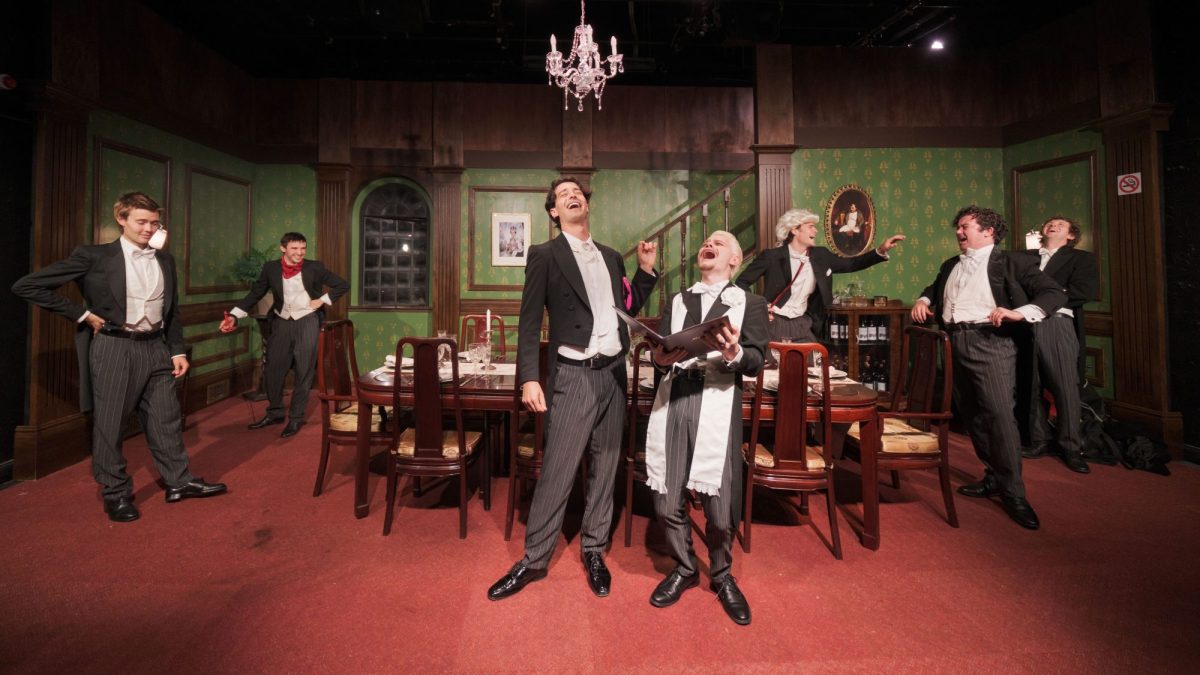When you enter the Old Fitz to watch Posh, you’ll find the set decorated for a formal dinner party with a chandelier and the character of Lord Jeremy Ryott waiting for the show to begin.
Posh, written by Laura Wade, is a fictionalised version of the Bullingdon Club, which is an exclusive young men’s club founded in 1780. The goal of the Club is to provide wealthy males attending Oxford University with an opportunity to forge an exclusive brotherhood. It is alleged that former British Prime Minister, Boris Johnson, was a member. Wade’s fictional derivative is known as the Riot Club.
The Riot Club consists of 10 students who meet once a term for a banquet. However, this is not just a simple get together. The meetings are steeped in a historic tradition of snobbery, and they are served with entrenched ritualistic behaviours, expectations and obligations. There are strict rules for members to follow, and these need to be fastidiously replicated each time the members meet. In fact, there is immense pressure placed on the Club’s President to ensure he achieves the humiliating benchmarks that have preceded him; and this aspect is a beautiful piece of irony.
The benchmarks reached by members at past meetings include bonding over shared perverse acts and participating in degrading rituals. Members must attend a banquet together, get completely written off and, most importantly, at the end of the meal, participate in an extreme act of vandalism by trashing the establishment that hosts them. Finally, they must pay the proprietor whose establishment they destroy ‘a wad of cash’ to make the whole problem go away.
Members of the Riot Club are not free to wear whatever they want. In this production of Posh, they attend the banquet in antiquated costumes, complete with coat tails, bow ties and pinstriped pants. More than this, they must sneak into the event with secrecy and not be spotted by the public.
Both in the literal and figurative sense, these characters are complete w***ers. They are fuelled by privilege, arrogance and misogynist attitudes. The full gamut of these values is on display during the production and it is relentless.
The performances by all cast members can only be described as outstanding; each adopting an accent, they play their parts so well that it is hard not to despise them. All performers do justice to Wade’s biting observations, witty vision and satirical dialogue.
During the play, the night spirals out of control for the 10 student members. Nothing seems to go as planned for them. Their choices on how to behave result in disgrace, shame and a need for intense secrecy. This leaves them vulnerable to exploitation from each other – and this is precisely the intent that has kept the tradition alive.
The members are not motivated into secrecy because of a moral conscience, but by the threat of the public finding out about their activities. Due to their high social profiles, careers and reputations, there is a risk to them if news were to get out about their obnoxious and violent behaviour. It would damage their social and political standings in the community.
By the end of the banquet, the members have established a vulnerability that can be exploited, and this creates a co-dependent existence among them. They need to rely on each other to stay quiet about the illegal acts they have witnessed and in which they have participated together. Their shared experience makes them a powerful group, indebted to each other, both in political and social arenas.
Director, Margaret Thanos, adds substance and depth to this production by weaving Lord Jeremy Ryott into the storyline. Ryott is a key figure – he is the metaphorical bastion and founder of the Riot Club – and it is he who sets the play and the players in motion.
Thanos not only cleverly commences the production with Ryott waiting in the audience to see how his masterpiece is going to play out, but also ends it with him.
It is Ryott who benefits from the abominable behaviour of the of the Riot Club members, a Club he established. The students’ vulnerability means that he can fully exploit them, take them under ‘his wing’ and form a tight society where he has the power and control over these wealthy and influential men. Their secrets become a guarantee of loyalty and a gateway for him to use them as his pawns.
The production moves well and maintains interest; however, it does wane a little after interval. At this point, the antics and motivations of the ‘aggrieved’ Riot Club members towards the ‘landlords’ of the UK become a little inaudible, illogical and confusing. The students having a gripe against ‘landlords’ doesn’t seem to be enough of a catalyst for the destruction to follow.
Read: Book review: Highways and Byways, Jimmy Barnes
Posh comes with a content warning. It features strong language, racism, simulated sexual violence, threats of gang rape, sexual acts, sexually explicit references and other acts of violence. On the night that this reviewer attended, several audience members did not return after interval.
Overall, Posh is an interesting production that leaves you feeling uncomfortable, but marvelling at the skill of the director and writer. It is performed well and this adds to its power and ability to affect an audience.
Posh
Old Fitz Theatre
Writer: Laura Wade
Director: Margaret Thanos
Production Company: Queen Hades Productions
Producer: Ryan Whitworth-Jones
Set Designer: Soham Apte
Costume Designer: Aloma Barnes Siraswar
Lighting Designer: Sophie Pekbilimli
Composition and Sound Design: Cameron Smith
Stage Manager: Chris Starnawski
Assistant Director/Understudy: Jack Calver
Intimacy Director: Shondelle Pratt
Fight Choreographer: Diego Retamales
Accent Coach: Felicity Jurd
Props: Jess Zlotnick
Marketing: Maddie Withington
Design Assistants: Benedict Janeczko-Taylor, Oscar Ali, Taylor Lawrence, Izzy Morrissey, Mariika Mehigan
Cast: Tristan Black, Toby Blome, Mike Booth, Christian Byers, Max Cattana, Roman Delo, AJ Evans, Ryan Hodson, Charles Mayer, Dylan O’Connor, Dominique Purdue, Jack Richardson, Scarlett Waters, Anthony Yangoyan
Posh will be performed until 17 May 2025.






